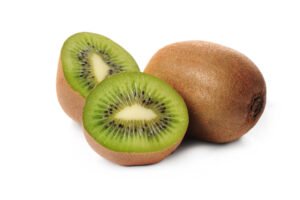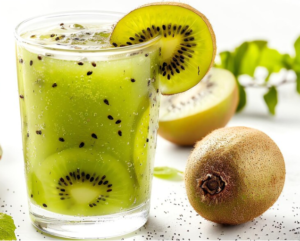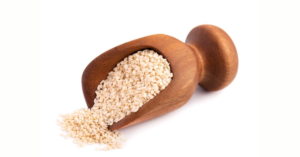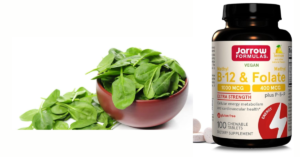Introduction
Kiwi, often referred to as the “wonder fruit,” is more than just a tangy and refreshing snack. Whether you’re trying to boost your immune system or improve digestion, the benefits of kiwi are vast and scientifically proven. Kiwi, a small yet mighty fruit, is loaded with a plethora of health benefits. It’s one of those fruits that packs a powerful punch in a small package. But what makes kiwi so special? This article will shed light on the benefits of kiwi and explore how adding it to your daily diet can improve various aspects of your health, from better digestion to glowing skin and beyond.
Table of Contents
Nutritional Profile of Kiwi
One of the primary reasons kiwi stands out as a superfood is its rich nutritional profile. A single kiwi provides an excellent source of Vitamin C, Vitamin K, Vitamin E, and fiber, along with essential minerals like potassium, magnesium, and folate. The vitamins found in kiwi play crucial roles in many bodily functions. For instance, Vitamin C is not just for boosting immunity but is also vital for collagen production and skin repair.
On top of this, kiwi is low in calories, with just around 60 calories per fruit, making it an excellent choice for those seeking a nutrient-dense, low-calorie snack.

Why Kiwi is a Superfood
Kiwi is often classified as a superfood because of its dense nutrient content and its ability to positively impact multiple areas of health. Unlike some fruits, kiwi provides a balance of vitamins, fiber, and antioxidants that help combat inflammation, support heart health, and improve digestive function. This unique combination of nutrients means kiwi offers a range of health benefits, making it a valuable addition to any diet.
Kiwi and Immune System Health
When it comes to boosting your immune system, kiwi is a front-runner. Studies have shown that people who consume kiwi regularly experience fewer instances of colds and respiratory infections. The high concentration of Vitamin C in kiwi strengthens the immune system, which is your body’s natural defense against illness. Research also indicates that the antioxidants in kiwi reduce inflammation, which can contribute to chronic illnesses.
Digestive Health Benefits
Kiwi is a fantastic source of dietary fiber, which aids in digestion. The fiber content in kiwi helps keep your digestive system regular, preventing constipation. A study published in the Asia Pacific Journal of Clinical Nutrition found that eating two kiwis a day can significantly improve bowel movements, making it especially beneficial for people suffering from irritable bowel syndrome (IBS).
Moreover, kiwi contains an enzyme called actinidin, which enhances protein digestion and can reduce bloating after meals.
Antioxidant Properties
One of the standout features of kiwi is its high antioxidant content. Antioxidants are compounds that neutralize free radicals, which can damage cells and lead to chronic diseases like cancer and heart disease. Kiwi contains a blend of antioxidants, including Vitamin C, Vitamin E, and flavonoids, all of which work together to combat oxidative stress in the body.
This antioxidant power not only protects against illness but also slows down the aging process, making kiwi a great choice for those looking to maintain youthful skin and overall vitality.
Improves Skin Health
Speaking of youthful skin, kiwi is also known for its ability to enhance skin health. The high Vitamin C content promotes collagen production, which keeps the skin firm and elastic. In addition, the antioxidants help prevent wrinkles and fine lines by protecting the skin from oxidative stress and sun damage.
Several beauty enthusiasts have also touted the benefits of applying kiwi topically to the skin, as it can improve complexion and provide a natural glow.

Heart Health Benefits
Eating kiwi regularly can also improve your heart health. Kiwis are rich in potassium, which helps regulate blood pressure by counterbalancing the effects of sodium. Moreover, kiwi’s fiber content helps reduce cholesterol levels, which can lower the risk of heart disease. A study conducted by the University of Oslo found that people who ate two to three kiwis per day experienced a reduction in blood clot risk, adding another layer of protection to your cardiovascular system.
Kiwi and Weight Management
If you’re looking to manage your weight, kiwi might just be the perfect fruit for you. Its low-calorie, high-nutrient profile makes it ideal for those trying to lose weight without sacrificing essential vitamins and minerals. The fiber in kiwi keeps you feeling fuller for longer, reducing the likelihood of overeating.
Additionally, kiwi has a low glycemic index, meaning it won’t cause sudden spikes in blood sugar levels, making it an excellent choice for weight-conscious individuals.
Kiwi’s Role in Reducing Inflammation
The antioxidants in kiwi, such as polyphenols and carotenoids, have anti-inflammatory properties. These compounds work to reduce inflammation in the body, which is often a precursor to chronic diseases like arthritis, diabetes, and cardiovascular disease. Regular consumption of kiwi has been shown to decrease levels of inflammation markers, providing long-term health benefits.
Kiwi for Better Sleep
Surprisingly, kiwi may also help you sleep better. Research conducted by Taipei Medical University found that eating kiwi before bed can improve sleep quality. The study suggests that kiwi’s serotonin content, a hormone that regulates sleep, may help people fall asleep faster and stay asleep longer.

Eye Health
Kiwi is packed with lutein and zeaxanthin, two powerful antioxidants that are essential for eye health. These compounds protect the eyes from age-related macular degeneration, a leading cause of blindness. Additionally, the Vitamin A content in kiwi helps maintain healthy vision.
Kiwi and Diabetes
For individuals with diabetes, kiwi can be a beneficial addition to their diet. Its low glycemic index means it won’t cause rapid spikes in blood sugar, and the fiber content helps regulate blood sugar levels. Moreover, studies have shown that kiwi’s antioxidants can help reduce the risk of diabetic complications by protecting cells from oxidative stress.
Mental Health Benefits
Lastly, kiwi may even benefit your mental health. The high levels of folate and Vitamin C found in kiwi are known to support brain function and reduce symptoms of depression and anxiety. Folate plays a crucial role in the production of serotonin, the “feel-good” hormone, while Vitamin C helps reduce cortisol, the stress hormone.
How to Include Kiwi in Your Diet

Including kiwi in your daily diet is easy and delicious. You can enjoy it as a snack, blend it into smoothies, toss it into salads, or even use it as a topping for yogurt and oatmeal. You can also try adding kiwi slices to your water for a refreshing twist.
Conclusion
Eating kiwi daily could indeed change your life. From improving digestion and boosting your immune system to enhancing skin health and promoting better sleep, the benefits of kiwi are undeniable. By making kiwi a part of your daily routine, you can experience these transformative effects firsthand.
Frequently Asked Questions (FAQ’s)
Yes, eating kiwi daily is safe and highly beneficial for your health due to its rich nutrient content.
Two to three kiwis per day is ideal to reap maximum health benefits.
Yes, kiwi is low in calories and high in fiber, making it an excellent choice for weight management.
Kiwi has a low glycemic index, making it a good fruit option for people with diabetes.
Yes, kiwi contains dietary fiber and actinidin, which help improve digestion and relieve constipation.
Yes, kiwi contains serotonin, which may improve sleep quality if eaten before bedtime.
Kiwi is rich in Vitamin C, which boosts collagen production and helps maintain youthful skin.
Yes, the antioxidants in kiwi help reduce inflammation in the body.
Some individuals may be allergic to kiwi, so it’s best to consult a doctor if you experience any adverse reactions.
Kiwi’s potassium and fiber content help reduce cholesterol and regulate blood pressure, promoting heart health.
Explore My Recent Articles

Everything You Need to Know About Brinjal’s Health Benefits
Introduction Brinjal, or eggplant, is a versatile vegetable loved for its unique taste and health benefits. Known as aubergine in Europe, this deep-purple fruit is packed with a range of nutrients that can benefit your

10 Surprising Ways to Improve Sperm Motility Naturally
Introduction to Sperm Motility When it comes to fertility, the motility of sperm plays a crucial role. Sperm motility refers to the capacity of sperm to move successfully through the female reproductive tract to fertilize

The Untold Realities of Breast Cancer
Beyond Pink Ribbons: The Untold Realities of Breast Cancer Breast cancer awareness has come a long way from being symbolized merely by pink ribbons. While the symbol remains poignant, it’s crucial to delve deeper into

Why Sesame Seeds Are Essential for Glowing Skin and Strong Bones?
Introduction Sesame seeds, small yet powerful seeds from the Sesamum indicum plant, have long been prized in various cultures for their impressive health benefits. Packed with vital nutrients, these tiny seeds play a huge role



